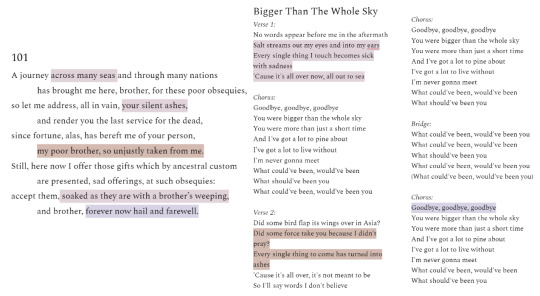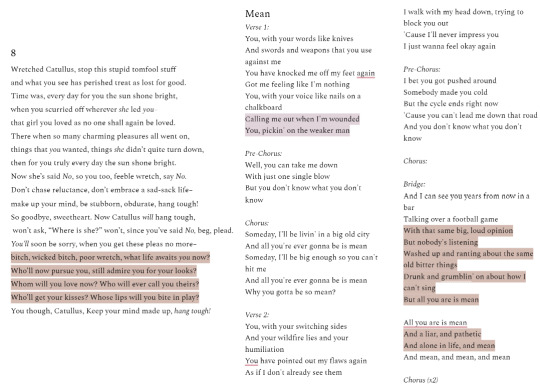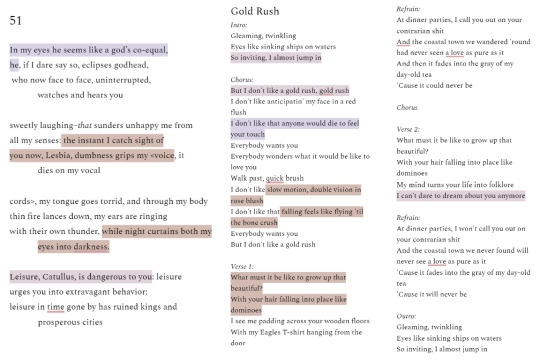Don't wanna be here? Send us removal request.
Text
Author’s Note
The purpose of this blog is to examine the similarities and differences between the Latin poet Catullus and the modern musician Taylor Swift. These posts allow a reader to get to know both Catullus and Taylor Swift by comparing them. This is a way to introduce Catullus to the average modern reader using an artist who is already familiar to them. For this reason, I have included Peter Green’s translations of the Catullan poems in order to make the poems more accessible to the modern reader without losing the poetic structure of the original Latin. Anyone should be able to read and enjoy this blog regardless of previous Latin experience or knowledge of Catullus.
These posts also demonstrate the timelessness of Catullus’ poetry. Even today, we can still enjoy and relate to many of his poems because they channel universal human emotions. His art creates a connection with readers across millennia. This is why it can so easily be compared to Taylor Swift's songs. Taylor Swift also captures enduring human emotions in a way that millions of people can relate to. If anyone can enjoy Taylor Swift, then anyone can enjoy Catullus.
I also intend for the reader to learn more about Catullus’ life and its influence on his poetry. Elements of a poet’s life often emerge in their work. Although Taylor Swift and Catullus are similar in many ways that impact their art, it is vital to recognize certain differences in their lives. Comparing the experience of Catullus to Taylor Swift allows a modern reader to better understand Catullus’ position in Roman society and the ways in which it shapes his poetry.
Finally, I would like you, the reader, to consider these questions as you go:
What is the difference between an ancient poem and a modern pop song? How does an artist’s life affect their work? What is the purpose of reading ancient poetry? What do you think future readers will take away from Catullus or Taylor Swift?
1 note
·
View note
Text
Goodbye, Farewell: Catullus 101 and Bigger Than The Whole Sky
The gift of an artist is the strange ability to capture the abstract in a concrete medium. Here I will be discussing how Taylor Swift and Catullus capture grief, and what it shows us about each artist. Some of Taylor Swift’s most moving songs are those that delve into the deep, raw parts of her emotions. She has multiple songs about grieving for family members, past love, or her past self, such as “epiphany,” “hoax,” “marjorie,” and “Soon You’ll Get Better,” but I chose one of her more recent releases “Bigger Than The Whole Sky.” I believe this song conveys grief as a general experience and uses similar imagery to Catullus 101.
Poem 101 gives us a rare glimpse into the mind of Catullus. An important question in studying Catullus is the impact of poetic persona. How much of Catullus’ poetry is his real emotion and how much is crafted to make him appear a certain way? This is hard to know since most of our knowledge about Catullus comes from his poetry. A similar dilemma appears with the modern celebrity. Taylor Swift has created a distinction between her public self, her writing, and her private life. Some people do not recognize the difference between what Taylor Swift sings about and her life, just as some scholars argue that Catullus’ poetry is an accurate representation of his real life.
Whatever the case is with Catullus’ persona in his other poems, this poem presents a genuine description of his grief. Although Taylor Swift often writes songs about imaginary experiences, her grieving songs channel experiences from her life, like the death of her grandmother and her mother’s sickness. In the same way, Catullus’ poem to his dead brother is a window of vulnerability. It is simply the sadness of a bereaved brother.
Catullus 101 also includes certain imagery that does not appear elsewhere in his work, with the exception of another poem about his brother. This poem is full of water imagery: multa per aequora (across many seas) in line 1, and manantia (soaking) and fletu (tears) near the end of the poem. I think the word order and structure of the original Latin poem are also supposed to mirror the flow of water. “Bigger Than The Whole Sky” also contains this water imagery with “salt streams out of my eyes” and “all out to sea” in the first verse. Weeping and water, along with ashes, are long-lasting symbols of grief.
These two works demonstrate a way in which Taylor Swift and Catullus are much more similar than different. They are both skilled in conveying deep, painful emotions through words, and they show a piece of themselves while doing it. They can incorporate a necessary level of honesty with the audience. They are also an example of how certain emotions and the symbols tied to them can be as timeless. Catullus’ skill as a poet carried his writing to the twenty-first century, and I believe that Taylor Swift’s work possesses a similar timelessness because of the artist’s unique ability to capture parts of the human experience.
Translation of Catullus 101: Catullus, Gaius Valerius. The Poems of Catullus: A Bilingual Edition. Translated by Peter Green, University of California Press, 2005.

2 notes
·
View notes
Text
Invective: Catullus 8 and Mean
For this post, we will explore a different side of Catullus and Taylor Swift. Those great love songs and poems come with heartbreak. Taylor Swift is known for being able to capture the strong emotions of heartbreak with songs like “All Too Well,” but she has a more bitter, angry side that comes out in songs like “Mean”. In addition to beautiful love poems, Catullus writes scathing invective poems, which target and insult a particular subject. Many of these poems are about political figures, men he is jealous of, or simply easy targets. However, sometimes he has also turned these poems on Lesbia. Catullus’ relationship with Lesbia is full of dramatic ups and downs, which include times when Catullus hates Lesbia.
The song “Mean” and Catullus 8 seem very similar. Both appear to scorn a lover and insult them intensely. Catullus calls Lesbia scelesta (wicked), and implies that no one will love her again. Swift does the same thing, calling the subject of the song “a liar, and pathetic/ and alone in life, and mean.” On the surface, both Catullus and Swift are simply writing mean things about an ex.
However, the context of the two artists’ lives changes the meaning of the writing. Taylor Swift is rich and famous, but she is also a woman. Swift has been open about the struggles she has faced in the music industry, including sexual harassment, men controlling her music, and being the target of many sexist jokes. Taylor Swift has fought against power structures that neither her fame nor wealth have freed her from. On the other hand, Catullus was a wealthy Roman man, which gave him more power and privilege than most Romans. He often insulted women in his invective poems with accusations of sexual promiscuity because they were easy targets. Taylor Swift and Catullus have very different positions in the power structures of their times, and this has a strong effect on the invective.
Taylor Swift, although sometimes a little too petty, is punching up against people with more power in society. “Mean” is a song about a man who manipulates and hurts her, but it is also more generally about those who take advantage of their power to put others down. In the song’s music video, Swift includes a boy being bullied for reading Vogue and a young girl being rejected by other girls for having a blue bow instead of a pink one. The video, along with the lyric “pickin’ on the weaker man,” positions the song as a fight against oppression. None of Catullus’ poems could have that connotation. Catullus insults Lesbia with petty bitterness, putting her down because she hurt him. Catullus loves her to the point that he let her control him, following after her everywhere, essentially sacrificing his masculinity. Most of Catullus 8 is encouraging Catullus to be strong and avoid going back to her, so his insults are also a way to reassert his power over Lesbia. While Taylor Swift works to fight the power structures that oppress her, Catullus was working to assert his own power and dominance in a society where he already possessed privilege.
Images from: Swift, Taylor. “Mean.” Youtube, May 2011, https://www.youtube.com/watch?v=jYa1eI1hpDE&ab_channel=TaylorSwiftVEVO
Translation of Catullus 8: Catullus, Gaius Valerius. The Poems of Catullus: A Bilingual Edition. Translated by Peter Green, University of California Press, 2005.



2 notes
·
View notes
Text
Secret Love: Catullus 5 and I Know Places
Secrecy. A theme that plagues the work of both Taylor Swift and Catullus. This theme has likely migrated from their personal lives to their writing. Taylor Swift’s relationships have appeared in tabloid articles and paparazzi photos and have been the subject of mockery, speculation, and judgement. Modern celebrities’ personal lives are considered entertainment for the public and open for comment. A large part of creating popular music in today’s world is participating in celebrity culture and opening your private life to public speculation. Although Taylor Swift has kept her relationship out of the public eye for the past six years, the themes of secrecy are still prevalent in her music. “I Know Places” was released in 2014 at the height of her public celebrity life.
How can Catullus’ experience compare to the public life of a modern celebrity? Catullus was no stranger to secrecy or forbidden love. The life of a prominent man in Roman society is much different from a celebrity today, mostly in terms of the scale of fame and surveillance, but the experiences do have similarities. Not very much is known about the life of Catullus, but he was a prominent figure in upperclass Roman society. He had connections to Caesar, and enough clout to insult many prominent people and get away with it. He was also involved in a scandalous affair with a woman he calls Lesbia in his peoms. This woman was likely a wealthy married woman named Clodia. According to Catullus’ poems, there was gossip about this affair among other Romans.
Catullus 5 is one of Catullus’ most famous poems and is known for the thousands of kisses. However, a very important element of this poem is its attention to gossip and Catullus’ enemies. He encourages Lesbia to pay no attention to the gossip and to instead kiss him thousands of times. These hundreds and thousands of kisses serve a special purpose. Superstitious ideas about curses and hexes were prevalent in Roman society. If a person knew the exact nature of something, such as the number of kisses between two people, they would be able to use evil magic to put a curse on them.
These two works show a link between the experience of the modern celebrity and an ancient Roman elite. “I Know Places” is characterized by its dark imagery, and the song encourages its the listener to ignore the whispers in the same way as Catullus 5. Catullus invites Lesbia to live and love with him by ignoring the gossip of those who disapprove of their love. Both Catullus and Swift captured the secret passion of forbidden love and the fun of ignoring the “haters.”
Translation of Catullus 5: Catullus, Gaius Valerius. The Poems of Catullus: A Bilingual Edition. Translated by Peter Green, University of California Press, 2005.

1 note
·
View note
Text
I DON’T like a gold rush: Gold Rush and Catullus 51
Taylor Swift: the pop star known for writing breakup songs about her boyfriends. Catullus: a Latin poet famous for his love poems. They seem as though they could not be more different. After all, what could a man from ancient Rome have in common with an American pop star? But, the feeling of falling in love transcends time. Reading the ancients shows us that our feelings of love and heartbreak are the same as those of people thousands of years ago. Human emotion builds a connection across the ages. It may be surprising to you that a Taylor Swift song could have so much in common with a Latin poem, but it makes more sense when you consider that both artists experienced the same human emotions of love and heartbreak.
Both “Gold Rush” by Taylor Swift and Catullus 51 include a vivid description of the speaker’s uncontrolled feelings for the person they desire and a conflict between those feelings and the speaker’s rational mind. “Gold Rush” begins with a whimsical introduction that invites the listener to immerse themself in the song: “Eyes like sinking ships on waters/ So inviting, I almost jump in.” However, with the chorus, Swift pulls herself out of this fantasy with “but I don’t like a gold rush.” The song continues to fluctuate between pull and push, falling and resistance, love and rationality.
Catullus 51 operates in a very similar way. The first three stanzas are a translation of Sappho’s fragment 31, which pulls you in with a vivid description of the speaker’s physical helplessness when faced with the one she loves. The fourth stanza of Catullus’ poem, instead of continuing the translation of Sappho, pulls the reader out of this description with an out-of-place condemnation of otium (leisure), which allows him to act without restraint. This poem demonstrates a conflict between the out-of-control, feminine desire of Sappho’s verses and the masculine rationality that Catullus commands himself to follow. The conflict between masculinity and femininity is an important part of this poem. Catullus includes a woman’s perspective on loving a woman but counters it with Roman ideas about how a man should behave. This demonstrates the broader conflict between emotion and rationality, which is also central to “Gold Rush.”
In both of these works, rationality is depicted as the winner of this battle. Catullus places his condemnation of leisure at the end of the poem, a very important place for the reader. Swift resists the feeling of love in the chorus, the most memorable and important part of a pop song. In “Gold Rush,” the speaker's resistance to love stems from past heartbreak: she flashes back to the blissful days of love in the first verse and refrain but tells herself in the chorus that she does not want it, resisting as a means of defense. I believe that in the fourth stanza of Catullus 51, Catullus is seeking to protect himself from another heartbreak by turning back to masculine rationality. The poem is speaking about Lesbia, the subject of many of Catullus’ poems, some that praise her and others that insult her for hurting him. Catullus is seeking to protect himself from the uncontrollable feelings created by the ups and downs of his relationship with Lesbia by following the values of Roman masculinity.
I have pointed out some parallels between the two works, which I have highlighted in the same color. I also invite you to read them and find your own similarities and differences.
Bibliography:
Greene, Ellen. “Re-figuring the Feminine Voice: Catullus Translating Sappho.” Arethusa, vol. 32, no. 1, 1999, pp. 1–18. JSTOR, http://www.jstor.org/stable/26309709.
Translation of Catullus 51: Catullus, Gaius Valerius. The Poems of Catullus: A Bilingual Edition. Translated by Peter Green, University of California Press, 2005.

4 notes
·
View notes